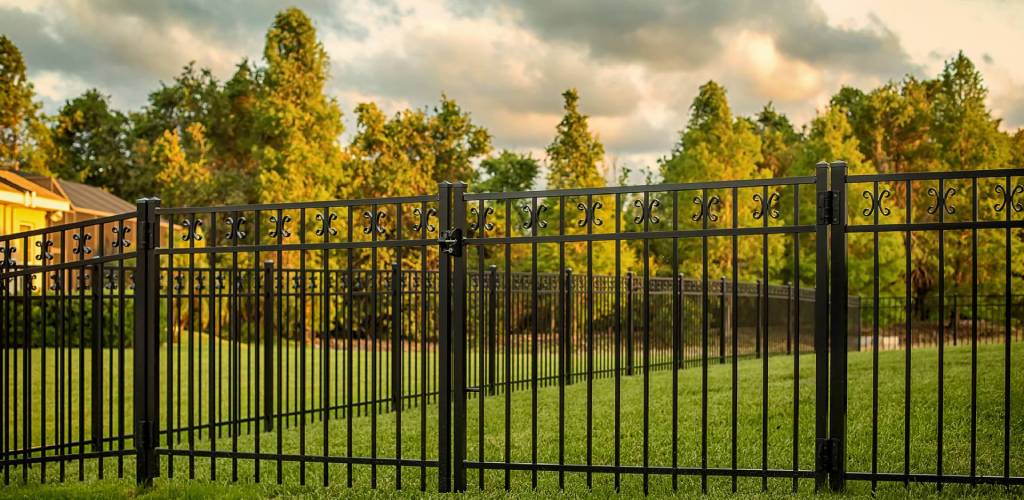All Categories
Featured

When installing a fence, selecting the appropriate material is key to balancing performance, looks, and budget. Timber, plastic, and light weight aluminum are amongst one of the most typically chosen fence products, each with its toughness and downsides. This overview explores the pros and disadvantages of these alternatives to assist you make a notified choice.

Timber Fence. Pros:. Natural Charm: Timber's classic beauty can improve any kind of building with its timeless and warm look. Personalized: You can repaint, tarnish, or carve timber to fit your design choices. Inexpensive: Timber fencing is originally more economical compared to a few other materials. Eco-friendly: As a renewable energy, wood is eco-friendly and usually taken into consideration environment-friendly. Disadvantages:. Maintenance-Intensive: Regular securing, painting, or staining is called for to avoid damage from climate and parasites. Prone to Degeneration: Without correct treatment, timber can rot, warp, or crack in time. Much shorter Lifespan: Typically, timber fencings last 10-15 years, depending on the kind of timber and upkeep. Timber is a fantastic choice for those that value aesthetics and want to invest in normal upkeep to maintain its appearance and resilience.
Plastic Fencing. Pros:. Reduced Upkeep: Plastic calls for very little treatment-- simply periodic cleaning with soap and water. Weather Resistant: It does not warp, rot, or catch insect damages, making it very durable in numerous climates. Durability: Plastic fencings can last 20-30 years with little to no repair work. Layout Selection: Available in a broad range of textures, styles, and colors, consisting of wood-like looks. Disadvantages:. Higher First Expense: Vinyl fences are extra pricey ahead of time compared to timber. Susceptability to Cold: In incredibly winter, vinyl can become fragile and prone to cracking. Minimal Repair Work Options: Matching replacement panels can be challenging if damages takes place. Plastic secure fencing is excellent for property owners looking for a lasting, low-maintenance solution that offers contemporary convenience.

Aluminum Fencing. Pros:. Rust-Proof: Aluminum resists rust, making it an exceptional option for damp or moist environments. Long lasting: Regardless of being lightweight, aluminum is solid and can stand up to extreme weather. Reduced Upkeep: It requires marginal upkeep, typically only occasional cleansing. Long Life expectancy: Aluminum fences can last decades without significant damage. Sophisticated Layout: Usually utilized for ornamental purposes, aluminum fencing adds a smooth, advanced want to residential properties. Cons:. High First Financial investment: Aluminum fencings are amongst the costlier alternatives on the market. Much less Personal privacy: The open layouts usual with light weight aluminum fencing don't supply much privacy. Vulnerable to Damage: While durable, aluminum can dent if hit with sufficient pressure. Aluminum is a superb option for house owners prioritizing aesthetics and toughness without requiring much upkeep.
Making Your Decision. When making a decision between aluminum, vinyl, or wood fence, consider your concerns:
Wood fits those that value a natural appearance and do not mind placing in maintenance initiative. Plastic is the very best choice for those seeking a low-maintenance, weather-resistant service. Aluminum uses streamlined design and durable durability but might lack privacy. By very carefully assessing these materials' features, you can choose a fencing that complements your home while satisfying your practical and aesthetic requirements.
Latest Posts
Unlock WyHy Federal Credit Union – High Rewards for Your Financial Goals
Published May 24, 25
1 min read
Shield Your Home with Top Quality Residential Roofing
Published May 23, 25
1 min read
Check Out Montclare Auto Repair’s Most Popular Car Care Solutions and Why Drivers Trust Them
Published May 23, 25
1 min read
More
Latest Posts
Unlock WyHy Federal Credit Union – High Rewards for Your Financial Goals
Published May 24, 25
1 min read
Shield Your Home with Top Quality Residential Roofing
Published May 23, 25
1 min read
Check Out Montclare Auto Repair’s Most Popular Car Care Solutions and Why Drivers Trust Them
Published May 23, 25
1 min read